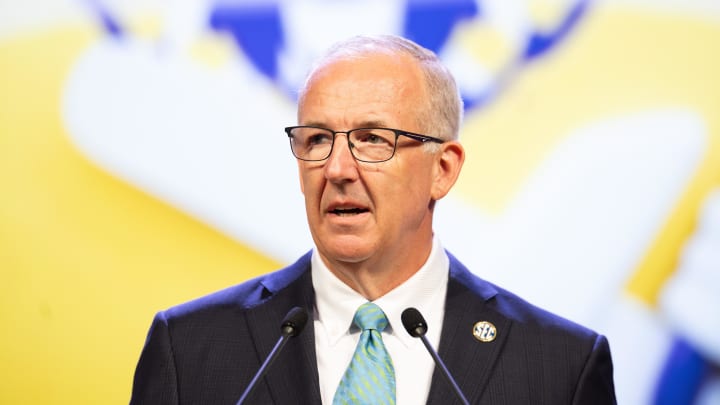Missouri Legislation Playing a Factor as SEC Searches for NIL Stability

College athletics, and especially football, has been a spawn for community in many places. They act as an incredible unifier.
Off of the field, however, college athletics is a jumbled orginization attempting to get its bearing in order in an everchanging enviroment impacted by name, image and likeness (NIL.) SEC commissioner Greg Sankey recognizes both of these to be true.
"We actually need more of what we do in college sports," Sankey said Monday at SEC Media Days in Dallas. "We are dealing with an incredibly complex set of issues that when I sit down with some of those leaders in the areas that I've mentioned and I describe the various challenges we face, it is universal, whether it's a professional league commissioner or a member of Congress, a high level attorney, at some point they'll look at me and say, that's the most complicated situation I've ever heard."
While most of the college athletics landscape is still figuring out how to manage NIL and its complicated implications, the state of Missouri and its flagship of Missouri has jumped ahead of the curve.
The state legislature, just 15 days after the NCAA approved its NIL policy, passed Section 173.280, outlining guidelines for the responisibilities of university athletic departments and athletes's rights to legal representatives and agents.
In July of 2023, the Missouri legislature provided its flagship university with a significant leg up in recruiting, revising Section 173.280, permittng Missouri high school athles to begin receiving NIL money as soon as they sign a letter of intent to a public university in Missouri.
This unity betweeen the state and the University was an appealing factor to new Missouri athletic director Laird Veatch. He recognizes this cooperation as an important element for Missouri athletics to succeed.
"One of the things that I really like about it is the alignment that it took between the athletic department, the university and the state to make that happen, and what that could also mean for our continued future in this environment."
In just over a year of the revised bill being enacted, the Unviersity of Missouri has greatly benefitted. The Missouri Tigers earned a commitment from the No. 1 prospect in the state in both the Class of 2024, Williams Nwaneri and 2025, Jack Lange. The last time before Nwaneri when Missouri landed the top commitment in the state was 2015 with quarterback Drew Lock.
From Sankey's perspective however, state legislation like Missouri's is adding complications to the NCAA reaching a stable, unified point when it comes to NIL. He also believes different states having indivual regulations for NIL creates an uneven playing field.
"They (the players) dislike this notion of every state having a different set of rules around how name, image and likeness is conducted," Sankey said. "They dislike lining up in contests and not having an understanding that those on the other side are held to the same standards.
In May, the NCAA and its power five conferences reached an agreement that will allow universities to directly pay student ahtletes. Additionally, the NCAA is in the process of settling three pending federal antitrust cases, paying current and former athletes over $2.7 billion in damages.
"There's a lot of work still to be done," Sankey said. "There's work to finalize the full terms of the settlement agreement. Beyond just terms is the hard work of implementing the outcome of that agreement. We are literally working to make what would normally be a decade's worth of change in a matter of months."
Sankey recognizes that the role he, along with other important faces in college football, will determine the path of college athletics for decades to come. There's no single solution to stumble upon.
"It's our leadership responsibility to figure this out. In a moment I'm going to repeat some things I've repeated in past years, and you could potentiallychange doesn't happen in an instant... The reality is there is no easy button we can just go push to resolve the issues we face. There's no magic pill. Anytime you go through a reset, it is difficult."
The constant change will continue to impact each athletics program, with Missouri being no exception. Missouri, however, is one step ahead with its current unity that the University will continue to benefit from.
